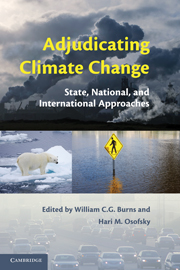Book contents
- Frontmatter
- Contents
- Foreword
- Acknowledgments
- Adjudicating Climate Change
- 1 Overview: The Exigencies That Drive Potential Causes of Action for Climate Change
- PART I SUBNATIONAL CASE STUDIES
- PART II NATIONAL CASE STUDIES
- PART III SUPRANATIONAL CASE STUDIES
- 17 Conclusion: Adjudicating Climate Change across Scales
- Index
Foreword
Published online by Cambridge University Press: 25 August 2009
- Frontmatter
- Contents
- Foreword
- Acknowledgments
- Adjudicating Climate Change
- 1 Overview: The Exigencies That Drive Potential Causes of Action for Climate Change
- PART I SUBNATIONAL CASE STUDIES
- PART II NATIONAL CASE STUDIES
- PART III SUPRANATIONAL CASE STUDIES
- 17 Conclusion: Adjudicating Climate Change across Scales
- Index
Summary
The world's political process has been slow to react to the serious, and potentially catastrophic, consequences for life on our planet that flow from the burning of fossil fuel. In one sense, this is understandable: turning around the global energy base is not a simple task. In another sense, it is inexcusable: a myopic failure to act in the face of clear scientific evidence. And among those who have failed to act, until recently, I include the legal profession. But as the pages of this book demonstrate, the long slumber of the lawyers is over.
I was one of those fast asleep. In the late 1980s, long after scientists had been researching the problem, but with global awareness of climate change emerging, I was horrified to realize that as a legal adviser to Shell I was facilitating extraction of the hydrocarbons at the heart of the problem. The obvious answer was to leave the fossil fuel in the ground and to begin the arduous, yet critical, task of “de-carbonizing” the world's economy. But I was naive to imagine that hope for such a turnaround would start with the very corporations whose legal structure drives their slavish servicing of the “demands” of the stock exchange.
It took me quite a while though to awaken fully. It was in 2001 that the Intergovernmental Panel on Climate Change published its finding that most of the observed warming at the Earth's surface over the past fifty years was likely to have been due to human activities.
- Type
- Chapter
- Information
- Adjudicating Climate ChangeState, National, and International Approaches, pp. vii - viiiPublisher: Cambridge University PressPrint publication year: 2009
- 1
- Cited by



